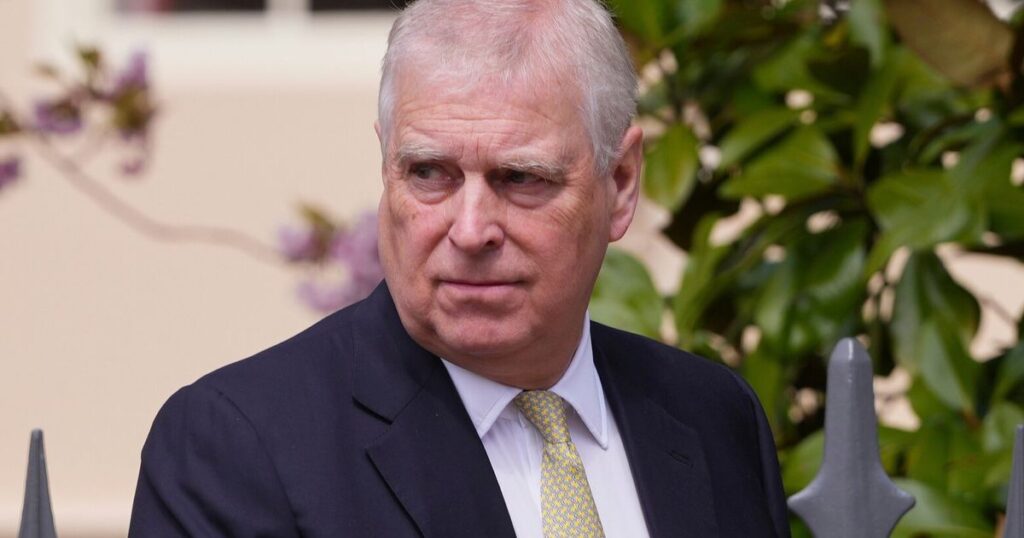LONDON — Britain has been one of the world’s most durable constitutional monarchies, in part because its two pillars — the crown and Parliament — stay out of each other’s business. King Charles III steers clear of politics, while Prime Minister Keir Starmer leaves the affairs of the royal family to the monarch.
That long-standing arrangement has come under rare stress in the last week, following scandalous new disclosures about Prince Andrew, the king’s younger brother, and his ties to convicted sex offender Jeffrey Epstein.
The details were outlined in a newly published email between Andrew and Epstein, and in a memoir by Virginia Roberts Giuffre, an Epstein victim who accused Andrew of raping her when she was a teenager — an accusation he denies. They have led to calls for him to be stripped of his most familiar title, prince. This would likely require an act of Parliament.
That, in turn, has set off a chicken-and-egg debate. The government says the decision of whether to deprive Andrew of his titles is one for the king, not for Starmer. Officials at Buckingham Palace say it would be improper for the king to take any position on a parliamentary act that might come before him for royal assent.
Both sides are drawing on centuries of convention, a powerful argument in a country with an unwritten constitution. Yet as the outcry grows over Andrew’s alleged misconduct during his friendship with Epstein, falling back on century-old laws and even more ancient customs is proving contentious.
“The argument that this is purely a matter for the royal family will not wash,” said Vernon Bogdanor, an expert on the constitutional monarchy at King’s College London. “Our monarchy since 1689 has been a parliamentary one. It exists only so long as Parliament, representing the people, want it to continue.”
On Wednesday, a Labour member of Parliament, Rachael Maskell, introduced a bill that would give the king the authority to rescind royal titles on his own initiative, following a recommendation from a parliamentary committee. Without the government’s support, however, it has little chance to pass.
Bogdanor said there were multiple hurdles to the government getting involved, not least that Andrew, 65, has not been convicted of a crime. He has steadfastly denied the accusations made by Giuffre, who died by suicide in Australia in April. In 2022, Andrew settled a sexual abuse lawsuit brought by Giuffre without acknowledging wrongdoing.
On Friday, Andrew announced that he would stop using one of his titles, the Duke of York, a step he took under pressure from his brother Charles. But he did not formally lose either the dukedom or the title of prince, to which he is entitled under a 1917 royal prerogative, known as a Letters Patent.
Under that decree, issued by King George V, the title of prince or princess is limited to the child of a monarch, the child of the sons of a monarch, and the eldest living son of the eldest son of the Prince of Wales, the heir to the throne.
Amending the Letters Patent to strip Andrew of his title is possible, experts have said, but it would be such a grave, unusual step that it would probably happen only if the king and the government agreed in advance.
The last time that a prince was deprived of his British titles was in 1917, when Prince Ernest Augustus, the head of the House of Hanover in Germany and the Duke of Cumberland and Teviotdale in Britain, was downgraded after swearing allegiance to an enemy, Germany, during World War I.
Beyond the legal hurdles, experts said there were political risks for the government in acting against a royal, even a disgraced one.
“The temptation will be there for some,” said Robert Ford, a professor of politics at the University of Manchester. “But any government would be worried about the precedent this would set in terms of politicizing the monarchy — particularly an instinctive institutional conservative like Starmer.”
That would be even truer if Charles opposed the effort to demote Andrew from being a prince. Ford noted that the government does not want to alienate the monarchy at any time, but especially when it has deployed the “soft power” of the royal family to deepen ties with President Donald Trump.
The government has left the job of punishing Andrew to his family. In 2019, after he gave a calamitous interview to the BBC about ties to Epstein, he was forced to withdraw from official duties. In 2022, after Giuffre sued him, he relinquished his honorary military titles and agreed to stop using the honorific His Royal Highness.
Yet the accusations keep coming. On Sunday, the Metropolitan Police said it was investigating reports that Andrew tried to dig up damaging information on Giuffre in 2011 through a police contact. Andrew did not respond, but Buckingham Palace said the reports should be investigated.
On Tuesday, the BBC and other news organizations reported details of a tenancy agreement that allows Andrew to live in the Royal Lodge, a stately house on the Windsor estate. In lieu of an annual rent, he paid a large sum upfront — around 8 million pounds, or $10.7 million, the BBC said — to renovate the 30-room residence. That kicked up a fresh storm of protest from critics who said the state was subsidizing Andrew’s baronial lifestyle.
The drumbeat of bad publicity comes against the backdrop of Giuffre’s book, “Nobody’s Girl,” which paints a tragic portrait of a young woman trafficked by Epstein to many men, including Andrew. Epstein died by suicide in prison in 2019.
Given the complexities of parliamentary action against Andrew, Bogdanor suggested a simpler form of redemption.
“Andrew should spend the rest of his life doing good works,” Bogdanor said, noting that Britain had a tradition of disgraced political figures — most famously John Profumo, a Conservative minister forced to resign in 1963 after a sex-and-espionage scandal — who clawed back some respectability by doing good.

